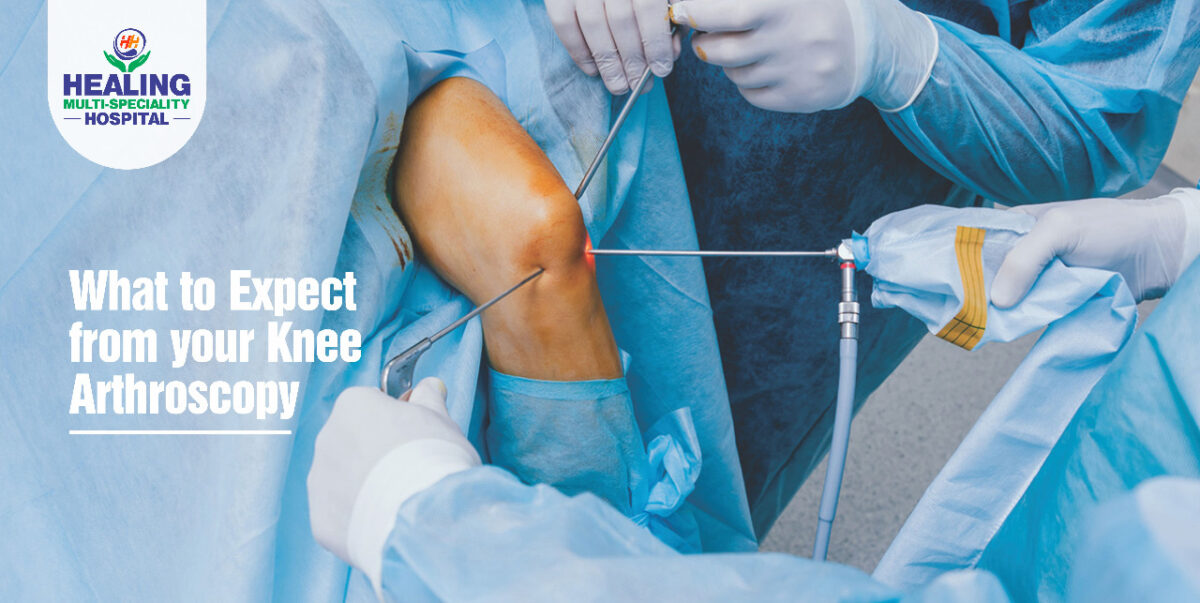Knee arthroscopy is a less invasive method of surgery that allows doctors to examine the knee joint without cutting through the skin or other soft tissues. Arthroscopy is used to diagnose and treat a variety of knee problems.
In the present time, arthroscopy is preferred by many due to it being less invasive, having a shorter procedure duration and recovery period, and having lesser complications in the surgery.
| Contents: When Is Knee Arthroscopy Helpful? What to Expect Before Knee Arthroscopy? What to Expect On the Day of Knee Arthroscopy? What to Expect After Knee Arthroscopy? Takeaway |
When Is Knee Arthroscopy Helpful?

In knee arthroscopy surgery, surgeons diagnose and treat problems using a very small instrument called an arthroscope, which is inserted through a skin incision. A camera is connected to the arthroscope, which helps doctors examine the joint.
Knee Arthroscopy may be helpful in the following cases:
- There is stiffness and discomfort in the joints
- Fluid gets accumulated that must be drained
- The cartilage is damaged
- Bone or cartilage fragments are floating
In the procedure of Knee Arthroscopy, firstly the diagnosis is confirmed. It is followed by repairing joint surface injuries, removing loose bodies, removing or repairing a torn meniscus, repairing articular cartilage, or reconstructing torn ligaments.
What to Expect Before Knee Arthroscopy?

Your orthopaedic doctor may advise you of the following changes two weeks before the surgery:
- You may be asked to stop taking any blood-thinning medications, such as ibuprofen, aspirin, naproxen, or other blood thinners.
- You may be asked to quit smoking as it can increase the risks of complications in surgeries and may slow down the healing process.
- You may be asked about your alcohol consumption.
- You may be asked if you have any illnesses.
What to Expect On the Day of Knee Arthroscopy?
- You may be asked to fast for at least 6 to 12 hours before the surgery.
- Any important medicines can be taken with a tiny sip of water.
- Your surgeon will decide which form of anaesthesia (local anaesthesia, regional anaesthesia or general anaesthesia) is best for you.
- Before you are taken into the operating room, a nurse will insert an IV in your arm if you are receiving general anaesthesia.
- You may be intubated with an endotracheal tube that will be attached to a ventilator to support you with breathing during the surgery if you are unconscious under general anaesthesia.
- Your knee may then be sterilized and sterilized linens may be placed near your knee.
- A positioning device may also be placed to make your knee stable during the operation.
- To begin the surgery, your surgeon will make a few tiny incisions around the knee. These portals will enable the surgeon to insert surgical instruments such as scissors, clamps, lasers, and arthroscope.
- After the surgery is completed, the fluids in your knee will be drained. Stitches, staples, or thin surgical tape will be used to close the portal incisions.
- The incisions on your knee will then be protected with a soft bandage as they heal.
- After monitoring vital signs, you should be able to go home within one or two hours.
Also Read: https://healinghospital.co.in/are-ex-athletes-at-a-higher-risk-of-joint-pain-later-in-life/
What to Expect After Knee Arthroscopy?
- You may not be allowed to drive for a few days.
- You may feel tired for several days.
- You may notice a different skin colour near the area of the incision.
- Your knee may be swelled for a few days. Elevating your leg as much as possible and applying an ice pack may help reduce the swelling.
- You will be asked to change your dressing regularly.
- You will be asked to follow an exercise regime to help with the recovery of your knee.
- You will be asked to visit your orthopaedic surgeon after a few days for a follow-up appointment.
- If followed by all instructions given by your orthopaedic doctor, you may be able to do light activities within 1 to 3 weeks and resume your normal activities within 6 to 8 weeks.
Book an appointment with the best orthopaedic doctor in Chandigarh here: https://healinghospital.co.in/orthopedic/
Takeaway
No one wants to get surgery. To prevent it, you should follow certain precautionary measures so that your knee does not get damaged.
These measures include maintaining a healthy weight, exercising and stretching regularly, wearing well-fitted shoes, and not kneeling on hard surfaces without knee pads. Make sure to eat a balanced diet and drink a lot of water to stay healthy.
























